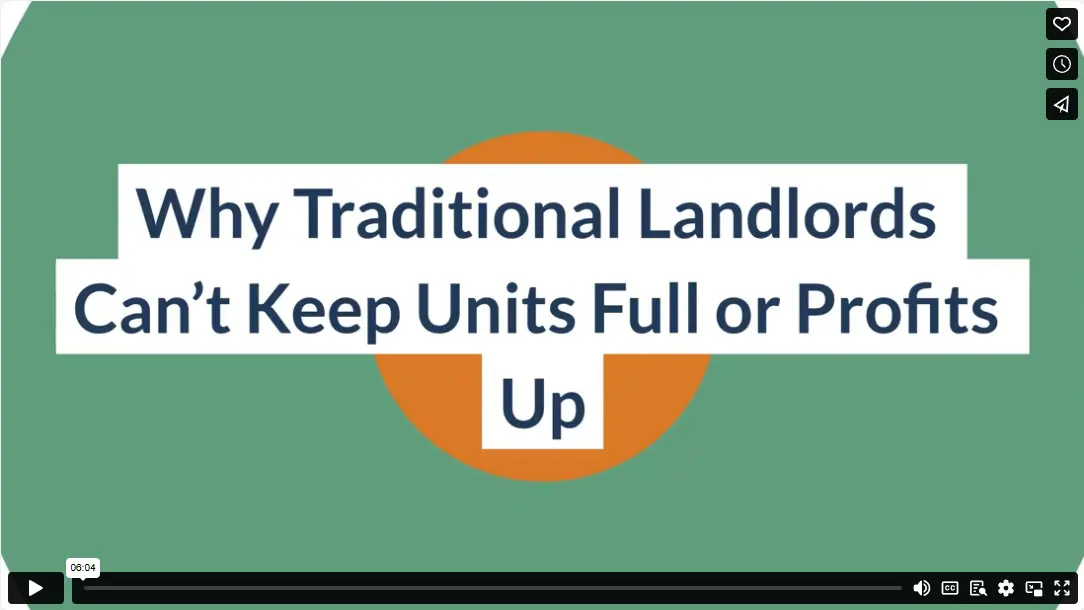Have you been managing rental properties the traditional way? If so, you might be noticing it’s getting tougher to keep units filled and maintain steady profits. What used to feel like a simple process—buy a property, rent it out, collect income—is now full of surprises. High vacancies, rising maintenance costs, tenant turnover, and outdated systems are cutting into your margins and causing frustration.
You might be asking yourself why things aren’t working the way they used to. The reality is that traditional property management just doesn’t cut it anymore. Tenant expectations have shifted, technology has changed how people find and apply for homes, and competition has gotten tougher. If you’re still relying on old-school methods, you’re probably facing a tough uphill climb, one that newer approaches, like turnkey property investing, are designed to help you avoid.
Let’s break down the reasons traditional landlords struggle and explore how you can take smarter steps forward.
Outdated Properties Turn Tenants Away
Tenants today are pickier than ever. They’re not just looking for a place to stay, they want updated, functional spaces with reliable systems and modern touches. If your property hasn’t had a real upgrade in years, it’s going to be tough to compete. Outdated kitchens, worn-out carpets, poor lighting, and old appliances can turn quality renters away.
Even if your rent is fair, renters will often choose a newer or better-maintained option. When your place doesn’t meet renter expectations, it sits empty. And every day without a tenant means lost income.
On the flip side, newer or recently renovated investment properties rent out faster and often bring in higher rents. If you’re not ready to keep up with upgrades, consider investing in a new, turnkey property that already has the modern look and feel tenants want.
Inconsistent Marketing and Leasing Practices
Traditional marketing strategies like yard signs, newspaper ads, or listing your property on just one rental site just doesn’t cut it anymore. Most renters are searching online across multiple platforms, and they expect things like clear photos, virtual tour options, and quick replies to their questions.
If you’re slow to respond or your listing doesn’t look appealing, potential tenants will move on to landlords who are quicker and more tech-savvy. Marketing can’t be an afterthought anymore, it’s a full-time job. Delays in communication are one of the biggest reasons landlords end up with empty units.
And don’t forget the leasing process itself. Are you screening tenants efficiently? Do you offer online applications and digital lease signing? If you’re still doing in-person showings and handling paper applications, you’re not just making life harder for yourself, you’re turning away renters who expect convenience and speed.
High Tenant Turnover and Poor Maintenance
Just because you fill your units doesn’t mean you’re making money. The real expenses hit when tenants move out. You’ve got cleaning, repairs, repainting, and marketing to do all over again. And if tenants only stick around for six to twelve months, that constant turnover can drain your cash flow.
A lot of landlords wait until something breaks before fixing it, but by then, the repair bills are usually bigger than they should be. Take an HVAC system, for example. If you don’t keep up with regular checkups, it could fail during winter when repairs are tough to schedule and tenants get unhappy.
If you’re not staying ahead of maintenance and focusing on keeping tenants long-term, your rental can turn into more of a headache than a money-maker. That’s where modern investing in turnkey properties has the advantage. These properties are usually updated, well cared for, and managed by pros who know how to keep turnover low and avoid costly repairs.
Poor Management
Trying to handle everything on your own can quickly become overwhelming. If you’re juggling late-night repair calls, chasing down late rent payments, and managing leases, all while working a full-time job or juggling other properties, you’re spreading yourself way too thin. That usually means slower responses, unhappy tenants, and more stress for you.
Without a dedicated property management team, there’s only so much you can do. When problems pop up, like a missed maintenance request or a rent dispute, it’s tougher to fix things quickly and professionally. Tenants notice that, and it makes it harder to keep them around.
A professional property manager brings the experience, systems, and resources to smoothly handle tenant communication, maintenance, rent collection, and legal compliance. If you’ve been avoiding hiring help to save money, you might actually be losing more through missed rent and turnover.
Lack of Technology
Real estate tech has come a long way, but not all landlords have caught up. You might still be collecting rent by mail, tracking expenses in spreadsheets, or keeping leases in a filing cabinet. Sure, these methods technically work, but they’re slow, clunky, and don’t scale well.
Today’s tenants expect things to be easy and digital. They want to pay rent online, submit maintenance requests through an app, and get updates by text or email. If your system can’t handle that, you’re missing out on smoother communication and making things harder for renters. The inconvenience can drive them away.
The good news? Technology helps you, too. With the right tools, you can automate rent reminders, pull financial reports, and keep an eye on your properties from anywhere. It saves you time, cuts down on mistakes, and lets you focus on growing your investment instead of getting bogged down in day-to-day tasks.
Time to Rethink Your Approach?
Being a landlord used to be pretty straightforward, but things have definitely changed. If you’re still sticking to the old way of doing things, you’re probably missing out on easier ways to manage and better returns. But don’t worry. You don’t have to change everything overnight. By slowly adopting smarter strategies and upgrading your tools, you can get back in control and make your investments work harder for you.
Remember, you’re not just managing properties, you’re running a business. Like any business, your success depends on how well you adapt. And if you don't want to take it all on yourself, you don't have to. Partnering with a skilled property management team can help you attract great tenants and take the hassle off of being an involved landlord off your plate. Just look for one that uses the right tools and approach to keep your property occupied and your tenants happy.
Video
Infographic
Managing rental properties traditionally is increasingly challenging due to rising tenant expectations and growing competition. This infographic highlights why traditional landlords struggle and offers insights on how you can make smarter choices moving forward.






